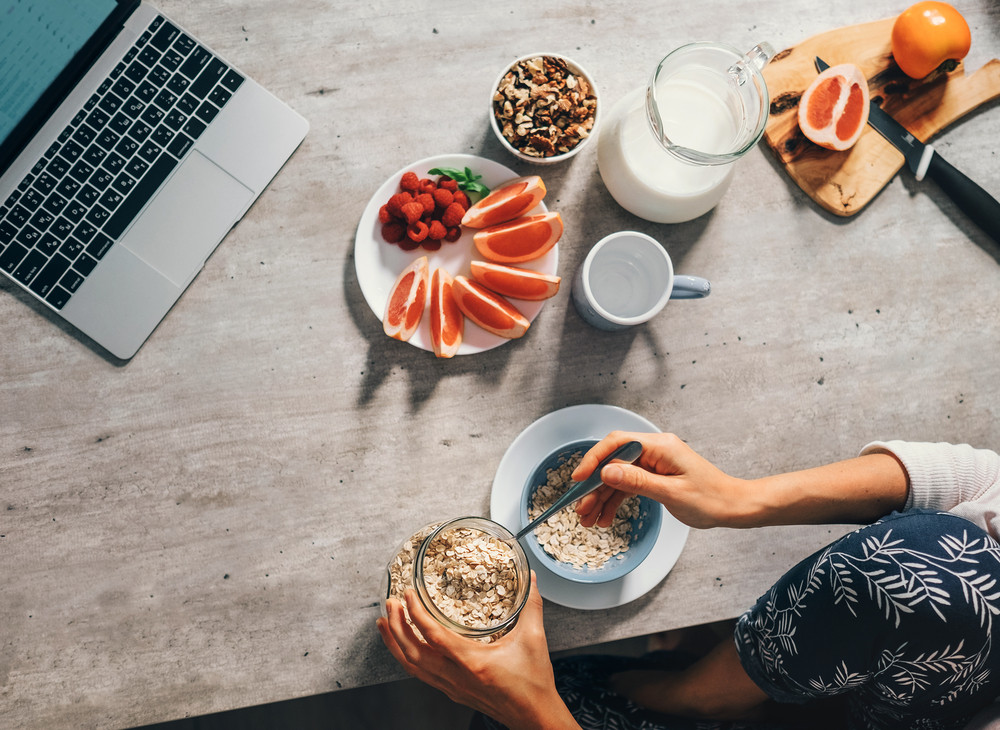By: Erin Kukura, MS, RD, UCSD Recreation Dietitian
There is no doubt about it that we are living in some pretty unsettling times. We are all trying to cope the best we can and eating may be your go-to way to manage anxiety, distress and to self-soothe. We eat for a variety of reasons and sometimes we eat purely as a coping mechanism. In conjunction with other healthy coping strategies there is nothing to be too concerned about. However, maybe you are finding yourself using food as your only way to cope, eating too much or not eating much at all to manage anxiety, distress or to self-soothe. If this resonates with you and you’re suffering from tremendous amounts of guilt and shame related to your food choices it might be time to look at some strategies to break this cycle.
- Go back to the basics – For many people, chaotic and unbalanced eating can actually lead to eating more overall and a less nutritious intake. For example, many clients share with me that they find themselves hungry, making less balanced choices in the evening when they’re starving and tired. This makes sense, when you’re hungry it’s hard to make a “balanced decision,” and you might also find that you tend to overeat at that meal, eating quickly and feeling overly full at the end. Once you start by eating balanced meals (including a protein, vegetable, starchy carb and healthy fat) throughout the day you can start to differentiate between whether you’re eating behaviors are related to eating emotionally or physically.
- Break the habit – A majority of our eating decisions are based around habit and routine. If you always eat dessert at night while watching Netflix you’re going to start pairing those activities together (ie. when Netflix starts you get cued to get dessert or vice versa). Start to take notice of how many of your eating behaviors are a natural part of your routine. For example, do you tend to eat a sweet in the breakroom during the afternoon slump, or find yourself eating after dinner when you’re winding down for the night.
- Separate food from feelings – To determine whether you’re eating for physical versus emotional reasons ask yourself the following questions. Where in your body do you notice the sensation of hunger? Is it in your stomach, feeling mildly empty, a slight headache, lack of concentration or mood changes (hangry) that signal you haven’t eaten in a few hours? Then you are likely physically hungry. Emotional hunger is experienced more “above the neck.” Namely, your mouth maybe is anticipating the taste, and you are typically craving something in particular that is very specific and highly palatable (think: cookies, cupcake, chips). You also typically don’t notice a sense of fullness until later that is often accompanied by guilt, shame, feelings of “doing better tomorrow.” If this sounds like you, you’re likely eating out of emotional hunger.
- Get curious – If you’ve identified you eat out of emotion, take a second to notice where does this typically arise in your day? Is it at work when you feel overwhelmed with a new project, after dinner when you finally get a chance to unwind? Ask yourself what am I feeling? Learn to identify what is going on. Are you angry, depressed, lonely, bored, anxious, stressed? This might cue you in to what feelings or situations are your triggers, and thus have now established the habit of experiencing a certain emotion or situation and paired it with coping via eating.
- Have a plan – When the next situation arises, take a moment and check-in. Am I physically or emotionally hungry? What am I feeling? Then ask yourself what do I need? If you’re lonely, do you need some connection? Can you call a friend, set up a Zoom call? If you’re anxious can you go for a walk, journal, talk to someone, or take some deep breaths. You’ll start to be able to build your coping skills toolbox and find other ways to cope without food.
- Show yourself compassion – We are all human, and therefore, we all have emotions. It’s normal to eat outside of pure “physical” need. We eat because we’re hungry, as a part of holidays, celebrations, out of emotion or what’s available. Additionally, with the current state of the world the last thing we should be doing is shaming ourselves over our food choices when we are all just trying to do the best we can in these times. So rather than berating yourself, show yourself some compassion and grace. Bring curiosity to your behaviors rather than judgement.
This is not the time to turn “stress eating” into rules (Why diet’s don’t work). We’re all doing the best we can and using our many tools available. If you’d like more assistance with changing your relationship with food, schedule an appt with our Registered Dietitian at https://recreation.ucsd.edu/wellness-services/nutrition/.


